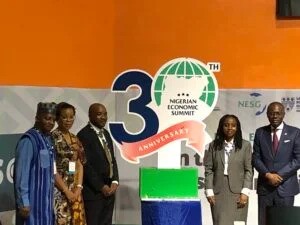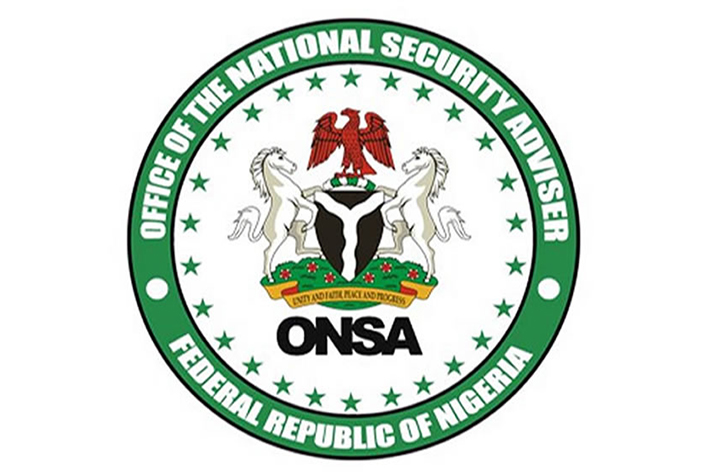News
Treat our members calling for interim govt as enemies of democracy – LP to security agencies
Rising from its National Executive Council meeting held in Bauchi on Wednesday, the Labour Party (LP) distanced itself from the call for an interim government, describing such a call as a treasonable act and charged security agencies to treat any of its members found engaging in such act as enemies of democracy.
The call was contained in the communique issued after the NEC meeting held at the Sulgad Hotel, Bauchi, read to journalists by the Publicity Secretary, Arabambi Abayomi, and signed by the party’s acting National Chairman and acting National Secretary, Bashiru Apampa and Saleh Lawal, respectively.
The communique further stated that the meeting forgave the party’s presidential candidate in the February 25 election, Peter Obi, his running mate, Datti Baba-Ahmed; the Abia State governor-elect, Alex Otti and all the party’s national and state Assemblies members-elect for attending what it termed, the illegal NEC meeting convened by the suspended national chairman of the party, Julius Abure.
According to the communique by Arabambi: “That the NEC in session believes in the rule of law and shall continue to stand with our presidential Candidate, Mr Peter Obi, to see to the successful reclaiming of our stolen mandate at the presidential election petition tribunal while noting that we will not be a party to any unlawful act to cause a change of democratic administration violently as anticipated by Barr. Julius Abure and his cohorts.
“That NEC in session distanced itself from any illegal call for an interim President and interim government of any kind and in any form and calls on security agencies to treat any member of the Labour Party found to engage in this treasonable act as an enemy of democracy and as the laws of the Federal Republic of Nigeria demands.
“NEC in session, therefore, appealed to the judiciary to, at all times, be in the part of the people by promoting acts that enhance democracy, rule of law, fundamental human rights and freedom of expression and speech by upholding the doctrine of separation of powers.
“That the NEC pardoned and forgave the 2023 presidential candidate of Labour party, Mr Peter Obi; Vice Presidential candidate, Senator Yusuf Datti; Mr. Alex Otti, governor-elect of Abia State; all the senators, members of the House of Representatives and state Assembly members elected on the Labour Party platform for attending the illegal NEC meeting of 18th April, 2023 in Asaba, Delta State organized by the restrained Barr. Julius Abure in contempt of the FCT High Court restraining order of 5th April, 2023 that restrained Barr Julius Abure and others from parading themselves as national officers of the Labour party (LP).”
It added that while the NEC in session suspended five of its National Working Committee (NWC) members over contempt of the High Court of the Federal Capital Territory (FCT) restraining by participating in the illegal NEC meeting convened by Abure in Asaba, it further recommended the affected members to disciplinary committees to try them for fraudulent and anti-party activities over the illegal, null and voided gubernatorial primaries in Imo, Bayelsa and Kogi states conducted on 15th April, 2023 as directed by Abure and suspended national secretary, Umar Farouk Ibrahim.
The NWC listed for suspension Prince Kennedy Ahanotu; Comrade Mrs Ladi Illiya; Dr Ayo Olorunfemi; Chief Innocent Okeke Agumba, and Mrs Dudu Manuga.
The NEC meeting reassured Nigerians that when LP takes over the country’s leadership after the presidential election petition tribunal mandate recovery, it would change the ugly narratives Nigerians face to the best ones.
News
Sanwo-Olu, NESG harp on PPP for economic growth


Gov. Babajide Sanwo-Olu of Lagos State has emphasised the role of public-private sector partnerships in driving accelerated sustainable economic growth in Nigeria.
He made the remark at the Nigerian Economic Summit Group (NESG) Public Lecture and Founders’ Forum held at the Lagos Business School on Thursday.
The event, which marked the official launch of the 30th anniversary of the Nigerian Economic Summit (NES) has the theme: “In the National Interest: Reflecting on the Past, Reimagining the Future.”
Sanwo-Olu said it was imperative that the public sector improved on its synergy with various actors pursuing a collective agenda of service for the citizens.
The governor highlighted the significant role the NESG plays in bringing together public and private sector leaders in the country in an ongoing dialogue to shape, influence and create a thriving competitive and successful economy.
“We’re not where we should be and we must continue to set goals to inspire ourselves to do better as a nation
“We may not always achieve our targets for our vision timelines, but that should not be an excuse for not trying,” he said.
He commended the NESG for its various interventions such as the flagship annual summit, roundtable and sectorial policy commissions, technical support work and policy innovation centre.
He, however, urged NESG to explore ways of deepening linkage between policy work and public consciousness that allows engagement with the citizenry.
Delivering the lecture, Mrs Ifueko Omoigui-Okauru, Managing Partner, Compliance Professionals PLC, said that while there had been significant economic changes, more needed to be done to ensure accelerated economic growth.
Omoigui-Okauru said that there was need to build inclusive policies that reflect the realities of the nation rather than imposing replicas of other countries.
“In 30 years, we may have made some progress, but we can’t say we have radically transformed Nigeria.
“As we reflect on the NESG, there’s still a lot to be done in bridging the rural-urban divide and have an inclusive agenda.
“We see our journey as work in progress. We need to determine the parameters that would drive our success and put policies in place to move us in the direction where we need to be.
“It is important for us to move away from self interest, think of ways to use technology and other frameworks to collectively achieve the Nigeria of our dreams,” she said.
Earlier in his opening remarks, Mr Niyi Yusuf, Chairman, NESG, said the 30th Summit reaffirmed the essentiality of public-private partnerships in tackling complex economic realities.
Yusuf, however, said that the journey to embracing market mechanisms has not been without its challenges.
He reiterated unwavering commitment in driving reforms through rigorous research, economic and social programmes, and inclusive summits, all aimed at shaping the socio-economic development of our nation.
“Thirty years ago, at a critical juncture in our nation’s history, the NES was born out of a necessity when the winds of economic challenges blew fiercely, necessitating a platform for robust public-private dialogue.
“Since our inaugural summit in 1993, the NES has been a progressive economic discourse rooted deeply in collaborative efforts between government leaders and private sector visionaries.
“Each Summit has crafted policies and strategies essential for removing barriers to competitiveness, growth, and inclusive development.
“Therefore, in commemorating this 30th anniversary, it is essential to assess and discuss the role of this public-private dialogue platform in Nigeria’s socio-economic landscape to provide us insights for future engagements,” he said.
The chairman assured collaborative efforts with the three arms of federal and subnational governments and private sector communities to propel Nigeria towards a more resilient, inclusive and prosperous future.
Dr Pascal Dozie, Chairman, NESG Advisory Board, listed political, economic, education and environment sectors as pathways to reimagining Nigeria’s future
Dozie, also pioneer Chairman of NESG Board of Directors, was represented by Mr Frank Aigbogun, Chief Executive Officer of BusinessDay.
He charged NESG to adopt new strategies in providing collaborative leadership in seeking answers to the following crucial questions.
“How do we strengthen democratic institutions and rule of law, foster culture of inclusiveness and representation?
“How do we promote transparency and accountability in governance and inculcate the culture of consequences for bad behaviour in every sphere of life?
“In economic reimagining, how do we diversify Nigeria’s economy, reduce dependence on oil, foster a business friendly environment and develop the much needed infrastructure base in a coordinated nationwide approach?
“How do we repurpose the educational system to focus on science, technology, engineering and mathematics, encourage technology entrepreneurship and innovation and address unemployment?
“For the environment, how can we develop sustainable agriculture and food security, promote sustainable practices, renewable energy and eco tourism?
“It is imperative that the NESG community leads from the front in not only providing actionable answers to these questions but also making sacrifices to ensure they are implemented,” he said.
Similarly, Chief Executive Officer of NESG, Dr Tayo Aduloju, said that strong institutions, political will, accountability by all stakeholders and the willingness for the government to allow private sector to drive growth were factors needed for a successful economic development.
“The challenge for us today is how to drive the country forward over the next 30 years in a way that is not just growth but growth that creates jobs and opportunities for everyone and no one is left behind.
“We are dealing with a country that is going through macro-economic volatility and instability.
“So, the lessons here at the forum are deep reflections of what should change in our approach, a stronger priority on execution, a deeper commitment on accountability of government systems to deliver and how economic barometers impact the ordinary man on the street.
“Our resilience to hold government accountable, to keep insisting that there must be an economy that works for all Nigerians, rule of law, an environment in which free enterprise is practiced, is what we must continue to fight for,” he added.
News
NCS FoU Zone ‘B’ Nabs Fake Customs Officer


News
ONSA directs full enforcement of Nigeria’s cybercrime law


The Office of the National Security Adviser (ONSA), has directed all law enforcement agencies, regulators, businesses and stakeholders to put in place mechanisms for the full enforcement of the Cybercrimes Prohibition Act.
This is to secure Nigeria’s Critical National Information Infrastructure (CNII), counter terrorism and violent extremism, strengthen national security and protect economic interests.
The Head-Strategic Communications, ONSA, Mr Zakari Mijinyawa, made this known in a statement on Thursday in Abuja.
He said that the directive was part of the concrete steps being taken to prevent the use of social media and other platforms by terrorists and organised criminal groups.
Mijinyawa said that Nigeria had in 2022, joined 66 other countries that signed and ratified the Budapest Convention on Cybercrime.
The convention was to enhance international cooperation, provide common platform and procedural tools for efficient and safe cyberspace.
This, he said is pursuant to section 41(2) (a) of the Cybercrime Act 2015 requiring conformity of Nigerian cybercrime and cybersecurity laws and policies with regional and international standards.
Mijinyawa said that African leaders had recently stressed the urgent need for improved deployment of greater support and resources towards strengthening cybersecurity activities in Africa.
He added that the measure was also in line with the agreement reached at the just concluded High Level African International Counter Terrorism Meeting in Abuja.
Mijinyawa said additional resources would be deployed to counter terrorism and violent extremism as provided in section 44(5) of the Cybercrimes Act.
-
capital market2 years ago
Rt.briscoe, FBNH, Others halts negative performance of stock market
-
Finance3 months ago
Court orders Sen. Victor Umeh to repay N136m bank debt to AMCON
-



 Abuja Update2 months ago
Abuja Update2 months agoUNDP, FG partnership needed to achieve inclusion, equity- Minister
-
Abuja Update1 month ago
Banks drive stock market performance with N147bn gain
-



 Business1 week ago
Business1 week agoTingo Group unveils Tingo Electric, Tingo Cola drink at Lagos launch
-



 Health2 weeks ago
Health2 weeks agoCapacity training will reduce migration of health workers- NPHCDA
-
News4 months ago
Oil thieves sponsoring malicious media campaign against Navy – Spokesman
-



 Infotech1 month ago
Infotech1 month agoWorld Backup Day: NITDA urges Nigerians to ensure backup of data






